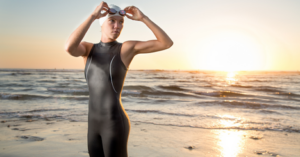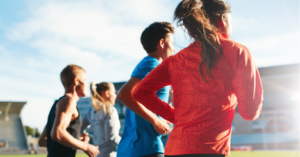Student Athletes & Body Image: How ED Can Develop with the New NCAA Name, Image & Likeness Rules
Reading time: 5 minutes
In the Summer of 2021, the NCAA announced its intention to allow student athletes across the country to benefit from their name, image, and likeness while still enrolled in school. While students are still not being paid for their direct participation in their sport, this has shifted the perspective many of these young students have on their role as an athlete. Now that it’s possible for these athletes to become public figures shortly after enrolling in college, it’s time to consider the possible mental and physical repercussions involved and how it may be fostering an environment where eating disorders can become more prevalent than ever before.
Overview of the New NCAA Name, Image, Likeness Guidelines
Up until recent years, student-athletes were strictly prohibited from accepting any form of outside compensation on their name, image, or likeness (NIL). This rule was followed for decades in an effort to maintain the “amateurism” of college athletics and because these students were already receiving scholarships and stipends for their combined athletic and academic performance.
However, as of July 1, 2021, the NCAA voted to approve new NIL rules, allowing student-athletes to finally take advantage of their name, image, and likeness to sell everything from training camps and social media endorsements, to autographs, sponsorships, and more. Currently, there are no limitations on which athletes or which sports can participate in NIL deals, but the collegiate athletics world has seen a substantial proportion of NIL transactions going to those playing football, men’s and women’s basketball, women’s gymnastics, swimming, and diving.
Building a Body for Performance, Not Beauty Standards
How the NCAA NIL Can Affect Body Image
Prior to the NCAA changing the NIL rules, student-athletes didn’t often consider themselves outside of their social or athletic role (i.e., athlete, student, teammate, etc.); this allowed them to focus on their athletic performance, educational responsibilities, and general college experience. However, as student-athletes accept NIL deals, their mindset shifts to include that of influencer, and even celebrity, putting their physical appearance at a higher priority than ever before in their life. This new mental shift puts more demand on their body, their relationship with it, and the relationship with their sport, which has now become their immediate livelihood, rather than their passion and potential future career.
Athletics & Public Opinion
Athletes, even those outside of their collegiate years, face immense pressure to physically perform to the best of their ability and maintain an appearance that adheres to sponsorship and endorsement agreements. If these adult athletes exhibit some of the highest rates of sport and socially-founded mental illness across the globe, it’s no surprise that student-athletes looking to sell their NIL are bound for the same callous, public scrutiny.
While many students today are already familiar with this pressure because of social media’s constant presence in their lives, the sudden growth in exposure upon becoming a recognized college athlete can prove overwhelming. The anxiety and other mental illnesses that are typically associated with being a public figure can quickly lead to an eating disorder, even without the student consciously making the choice to change their relationship with food and exercise.
Warning Signs to Consider
Obsession with Food & Exercise
While college can already be a rocky time in any student’s life and relationship with food, student-athletes that are working to capitalize on their NIL may be setting themselves up for a more stressful and challenging uphill battle. If you see an athlete becoming more conscientious about aspects of their workout that don’t contribute to their performance, or recording their exercises with the intention of posting them on social media, it may be time to keep an eye on their habits.
Additionally, athletes that exhibit an obsessive behavior over what they’re eating or have begun counting every calorie they ingest without the instruction from a coach or trainer, it could be time to have an honest conversation with them about the pressure their NIL choices are putting on them.
Behavioral Changes
Sudden changes in behavior are a common warning sign that someone may be developing an eating disorder, and this continues to hold true for student-athletes. Once a student has begun to develop an unbalanced mindset around eating, they can often be seen avoiding social situations if they suspect food will be involved, experiencing unexpected changes in their sleep routine, and even exhibiting irritability or mood swings out of their usual character.
An athlete that’s withdrawn from their usual social circle, whether it’s friendly, family, or both, has inadvertently pulled away from the support system that’s vital to a healthy lifestyle and eventual ED recovery. While the pressure student-athletes are under can cause the occasional extrovert to isolate for a short while, it’s worth offering support when a sudden behavioral change is maintained long-term.
Weight or Body Composition Changes
As a trainer, coach, or health consultant, physical changes in a student’s appearance or body composition may be the easiest warning sign to spot in an athlete with a potential eating disorder. While the NCAA’s NIL rule has allowed student-athletes to earn compensation for their likeness, it’s always added more pressure to maintain a certain aesthetic appearance that may not always be realistic in an athletic, changing body.
These body composition changes can include a sudden decrease in muscle mass due to a lack of vital nutrients or a drastic increase or decrease in their weight because of potential binging and purging habits associated with bulimia nervosa. As with any other student, early intervention is one of the best practices to help address an eating disorder and help encourage a successful recovery that puts them back in the performance over aesthetics mindset.
Once coaches, trainers, and other professionals in contact with student-athletes can learn to recognize the common red flags of an eating disorder and understand the need for comprehensive ED awareness, we can create a culture where beauty standards take a backseat to physical and mental health and athletic performance.
If you are a student-athlete, a coach, trainer, or a friend that needs personal support or knows someone who may need help, the Athlete EDGE team at EDCare is here to help. Our understanding specialists have the understanding and expertise to assist with a variety of eating disorders and will help build a recovery program built specifically for athletes. Contact us at (866) 421-5736 to schedule a free, confidential assessment or fill out our inquiry form to get started now.


